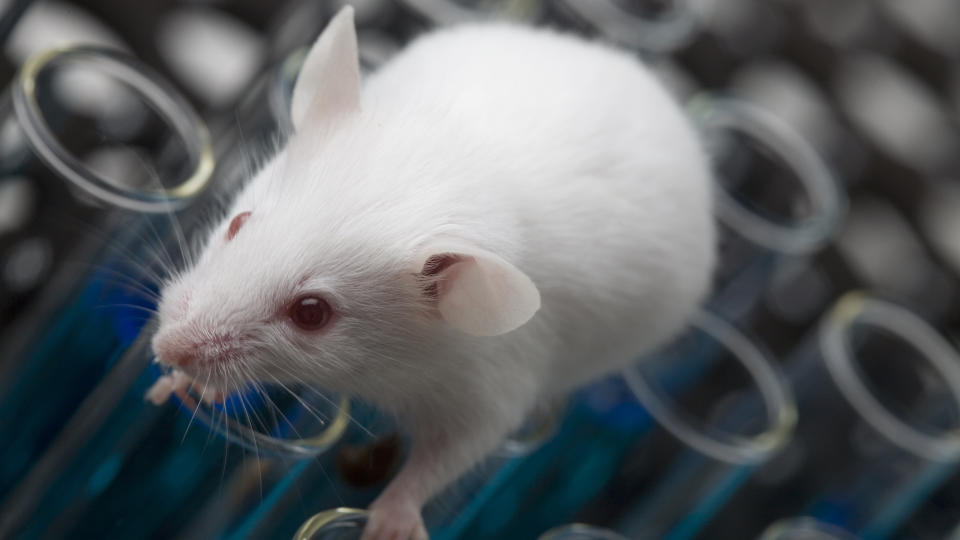A single, small molecule can restore muscle strength, fuel brain cell growth and reduce inflammation in old mice, new research shows.
So far, the anti-aging molecule has only been tested in rodents and in human cells in lab dishes. But the researchers say the results are compelling enough to move the compound toward human trials, potentially within a few years.
“Given the strength of the preclinical data, it is my view that there’s justification for moving this forward,” said senior study author Dr. Ronald DePinho, a professor and former president at The University of Texas MD Anderson Cancer Center.
“We have confidence that this mechanism would have beneficial effects with respect to things that impact health span,” enabling people to live healthier lives into old age, DePinho told Live Science.
Related: ‘Biological aging’ speeds up in times of great stress, but it can be reversed during recovery
Reversing aging with one molecule
In the new study, published June 21 in the journal Cell, researchers looked to increase the amount of a protein that normally dwindles with age: telomerase reverse transcriptase (TERT).
TERT is a key cog in a cellular machine that extends the length of telomeres — protective caps that prevent fraying at the ends of chromosomes. The shortening of telomeres has been tied to aging and age-related diseases, such as cancer. This shortening happens partly because, with age, chemical tags build up on our chromosomes, causing what’s known as “epigenetic” changes. Some of these changes switch off the gene for TERT, causing cells to make less of the protein.
This threatens the integrity of telomeres and has wide-ranging effects on how much other genes are expressed. That’s because TERT seems to be a master controller that helps regulate a suite of genes tied to aging, including genes involved in brain cell growth and senescence, a zombie-like state that more and more cells enter as the body ages. As these zombies grow in number, they trigger damaging inflammation in the body.
“Our lab was the first to show that aging is a reversible process,” and that TERT can mediate that shift into reverse, DePinho said. In 2010, DePinho and colleagues reported that, when they switched off the TERT gene in mice using experimental methods, the animals aged prematurely.
“When we flipped it back on, we were expecting just an arrest of the aging process,” DePinho said. “But instead we saw rejuvenation.”
This rejuvenation showed up in cells across the body. Subsequent work by the team showed that restoring “youthful” levels of TERT in a mouse model of Alzheimer’s disease reversed signs of the illness, including the accumulation of abnormal proteins in the brain.
Given these results, in the new study the researchers wanted to uncover drug-like substances that could boost TERT to levels seen in healthy, young cells. They developed a screen using mouse cells tweaked to carry the human version of the TERT gene. They screened 653,000 compounds in total, landing on one that appeared most potent, which they dubbed TERT-activating compound (TAC).
Related: Extreme longevity: The secret to living longer may be hiding with nuns… and jellyfish

In lab dishes, the molecule increased the amount of TERT in healthy human cells and in cells derived from people with Werner syndrome, a rare condition that causes rapid, premature aging. These latter cells notably lengthened their telomeres when exposed to the molecule.
In mice injected with TAC, the molecule boosted TERT in tissues throughout the body, including the brain. This suggests the drug passes easily into the brain, DePinho said, which many molecules cannot.
In aged mice, the researchers looked at short-term treatments with TAC, lasting around one week, and chronic treatment lasting six months. The short-term treatment reversed signs of aging in blood cells; reduced a known driver of senescence in many tissues; and boosted a key molecule for brain cell growth. Long-term treatment increased brain cell growth in the hippocampus, a key memory center in the brain, and also seemed to improve the rodents’ performance in memory tests. Additional tests showed it improved the mice’s coordination and muscle strength, too.
TAC works by jump-starting a chain of events in cells that switches on a master gene regulator and ultimately unmutes the TERT gene. These effects are temporary, peaking within about eight hours and wearing off after 24 hours of injection, DePinho said.
Within that time window, the drug “restores physiological, youthful levels of TERT,” he said.
RELATED STORIES
—Pregnancy may speed up ‘biological aging,’ study suggests
—Exercise may reverse sign of aging by ‘flushing’ fat from muscle
—Skin cells made 30 years younger with new ‘rejuvenation’ technique
More work will be needed to bring TAC to human patients. The next steps will be to modify the drug to improve its potency as well as identify and weed out any harmful effects. (None were observed in these initial experiments.) The drug, or a derivative of it, will need to be tested further in animals before moving into trials with healthy human volunteers and then people with various age-related diseases, DePinho said.
In theory, the drug could be explored as a way to prevent age-related disease before it even sets in, but it would likely be approved for a specific disease, like Alzheimer’s, first, DePinho said.
Ever wonder why some people build muscle more easily than others or why freckles come out in the sun? Send us your questions about how the human body works to [email protected] with the subject line “Health Desk Q,” and you may see your question answered on the website!
Source Agencies

